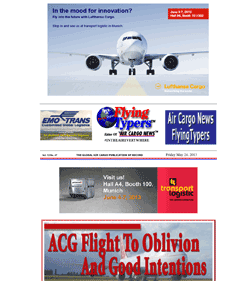
(Leipzig
Exclusive)—If
style and high profile meetings
of the powerful in government
and business mean anything (and
both certainly do), then a big
transportation conference gets
high marks even though the most
important news to come out of
The Annual Summit of the International
Transport Forum (ITF), held
last week in Leipzig, Germany,
from May 22-24, 2013, is that
Leipzig will continue to host
ITF until at least 2017. “We
are pleased to continue to host
this event in Leipzig,”
proclaimed German Minister for
Transport and Infrastructure,
Peter Ramsauer.
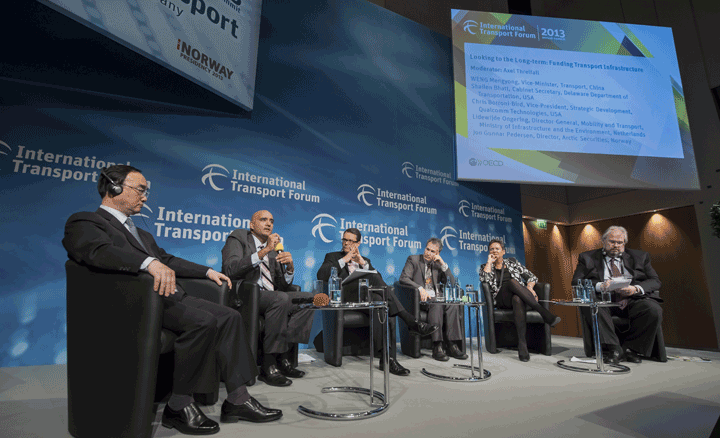 Panelists
at the ITF Summit on Funding
Transport. Panelists
at the ITF Summit on Funding
Transport.
From
l-r: China's Vice-Minister
of Transport Mengyong
Weng; Cabinet Secretary,
Delaware (USA) Department
of Transportation, Shailen
Bhatt; Moderator Axel
Threlfall; Vice-President,
Strategic Development,
Qualcomm Technologies
Inc., Chris Borroni-Bird;
Director-General for Mobility
and Transport, Netherlands
Ministry of Infrastructure,
Lidewijde Ongering; and
Director and Founding
Partner, Arctic Securities,
Jon Gunnar Pedersen.
|
In
its broadest sweep, transport
has important implications all
over Germany, so while the lead
up to ITF was pushed in the
media, expectations were raised
that an Airbus 380 of policy
initiatives might take wing
in Leipzig.
At
first blush the reality seemed
more akin to the celebratory
launch of a hot air balloon:
there was a series of panel
discussions and speeches between
stakeholders and government
officials, side jaunts down
bicycle paths, a trip into an
auto factory, and other tech
briefings.
Sure,
there were good feelings all
around, and maybe under the
microscope of closer examination,
something big will emerge.
But
the takeaway for Germany from
Leipzig last week is that German
transport in most cases will
continue across the board, following
a familiar course at least into
the near future.
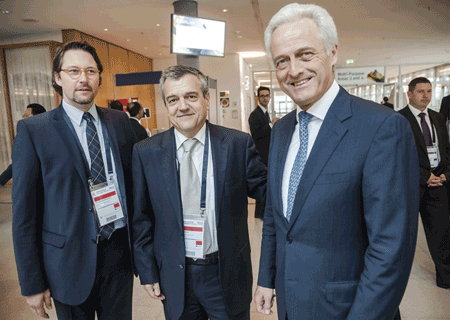
Another Show . . . Andreas
Scheuer, José Viegas,
and Peter Ramsauer at
the ITF Summit.
German Parliamentary
State Secretary Andreas
Scheuer, ITF Secretary-General
José Viegas, and
German Minister of Transport
Peter Ramsauer pose for
the camera at the opening
of the International Transport
Forum's 2013 Summit on
“Funding Transport”
in Leipzig, Germany, on
May 22, 2013.
|

Secretary-General
Jose Viegas told conferees at
ITF that massive resources are
needed, as air passenger volumes
alone would double by 2030,
with cargo freight volumes to
triple over the same period.
According
to the OECD, the construction
or extension of existing aviation
hubs, ports, and rail tracks
would cost about $11 trillion
(8.5 trillion euros) over the
next 17 years.
Funding
for essential infrastructure
should be sought from private
investors, he said.
He
differentiated between developing
nations requiring massive expansion
of transport-related infrastructure
and developed nations, for which
“green mobility”
requirements would be the challenge,
resulting in the need to establish
entirely new forms of sustainable
infrastructure.
Mr.
Viegas emphasized that in times
where governmental funding may
not be available, states must
turn to measures of public-private
funding and establish environments
suitable for such investments
from private enterprises, generating
a suitable return on such investments.
Viegas
said only public-private partnerships
could resolve the massive funding
problem.

The
City of Leipzig is a bit of
a success story in regard to
transport itself, since LEJ
airport used to rank at the
bottom of German airports until
2007.
But
since DPWN/DHL inaugurated its
European Hub in Leipzig, LEJ
has steadily risen to the number
two airport in Germany in terms
of cargo tonnage handled (863,665
t), according to ACI figures,
surpassing both Munich (272,000
t) and Cologne-Bonn (751,183
t), second only to Frankfurt
(2,100,747t).
Sure
enough, moving the European
Hub for logistics giant DPWN/DHL
was a much touted event and
driver for the local economy
here (DHL directly employs more
than 3,500 staff in LEJ); however,
as speakers at ITF continued
to point out, transport and
economy are globalized in nature
these days, and the settling
of DHL in LEJ came at a considerable
cost of job losses in Brussels,
Belgium, where DHL had located
their European hub previously.
Some
of the main reasons, as we were
reminded, for DHL picking LEJ
was the ability to operate 24/7
in LEJ (ironically, there is
a night curfew in LEJ for passenger
flights that does not extend
to cargo express flights) and
the low salaries in the German
East, which has been plagued
by record unemployment since
German reunification.
Today,
with LEJ as home base of DHL
and Lufthansa joint venture
Aerologic, LEJ is also an MRO
location for Antonov 124, stationed
in LEJ under the NATO/EU transport
agreement—two AN 124 are
permanently stationed there
with four more on backup.
A
number of other logistics providers
have chosen to settle in LEJ,
such as Amazon, K & N, and
Schenker.
Whether
this has propelled Leipzig into
the “world elite of world
transport,” as Minister
Ramsauer fabulated in his remarks
at ITF, is debatable.
Delegates cycle
through Leipzig.
Delegates
enjoying the Bicycle Tour
of Leipzig on the last
day of ITF last Friday. |
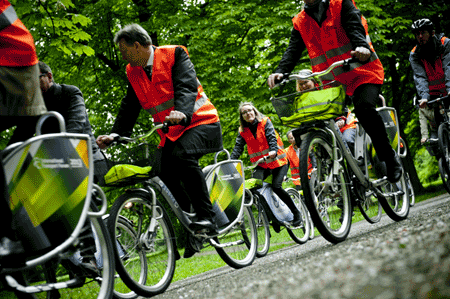 |

There
was an event of immense color
and glamour, and an obvious
message that this gathering
wanted to send out to the world,
as many of the delegates on
the last day of ITF 2013 put
on their helmets and went out
into the streets and parks of
Leipzig for a self-powered “ride
on a bike.”
But
a broader look at the content
of ITF 2013 reveals that actually
none of the speakers—either
from the political side or industry
stakeholders—at ITF delivered
commitments to the “sustainable,”
“green,” or “environmentally
friendly” ways of transporting
both people and freight.
Minister
Ramsauer, among others, admitted
that just “preserving
the infrastructure would require
additional funding,” highlighting
the fact that Germany, fortunately,
still has economic growth and
a rising tax volume. The fact
is that out of a current price
of roughly 1,60 Euros per liter
of conventional E10 fuel in
Germany, about 0.906 Euros are
taxes: fuel tax, including the
so-called “eco tax,”
make up for about 0.655 Euros,
0.003 Euros fuel resource contribution,
and the 19 percent German VAT.
It
is important to understand that
the aforementioned “eco
tax” is not used to fund
ecological research or projects,
but merely is a means to prevent
further hikes of German social
insurance contributions.
Also,
the German government pushed
the E10 fuel (mineral-oil based
fuel with a 10 percent bioethanol
content) into the market, loudly
threatening gasoline companies
when they were abandoning the
previous E5 fuel (5 percent
bioethanol content) for lack
of a sufficient number of gas
pumps at stations.
Eventually
E5 was abandoned, and car owners
whose engines could not make
do with the E10 mix had to resort
to the much more expensive premium
fuels (which, in turn, also
generated much-welcomed higher
tax contributions).
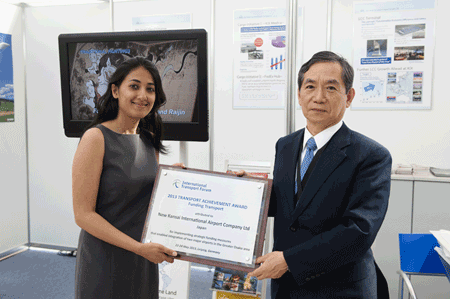 |
Big Winner Big
Award . . . Of course
there were awards, but
at Leipzig too big is
not enough!
Here,
winner Keiichi Ando, President,
New Kansai International
Airport Company (NKIAC)
gets a Transport Achievement
Award that is so large
he also receives an assistant
to help hold up the honorarium
at the Meet the Award
Winners Media Event last
Thursday. |

Interestingly,
although the ITF event took
place in Europe, some key USA
stakeholders that are perhaps
looking in the same mirror were
present to take notes and even
address issues last week in
Leipzig. Reports indicate that
U.S. and Canadian infrastructure
is not all that much better
off, albeit the direct and indirect
tax levels in North America
are admittedly at a less shameful
level.
Despite
proclaiming that infrastructure
and sustainable transport is
a stronghold of the economy,
European and other Governments
continue to tax transportation
to make up for lost income—most
notably, the British and German
Air Passenger Taxes levied on
all passengers departing from
these states (and therefore
boosting traffic on airports
close to the borders) or the
much-challenged European ETS,
whose implementation had lately
been suspended pending an agreement
on ICAO level.

Discussion
of the construction of the new
Berlin Airport is a good example
of why policymakers should not
hold board seats or approve
taxpayers spending.
Cost
explosions to build BER have
gone from just above 2 billion
Euros to about 5.4 billion Euros.
Yet
today these overruns cannot
be explained in any rational
way.
When
it became public knowledge that
even the postponed opening in
June 2012 (original plans called
for opening in 2010) had to
be abandoned because of the
smoke exhaust system not being
functional (and a lack of gate
space), the inside joke was
that the new BER airport could
use a good dose of being “Managed
by FRAPORT.”
As
it turns out, the joke has imitated
reality: the supervisory board
of BER fired airport manager
Manfred Koertgen and Rainer
Schwarz, the Berlin airport
CEO, in order to bring Horst
Amman on board.
Herr
Amman arrived at BER with a
track record of overseeing a
number of large construction
projects in FRA, most notably
the new runway Northwest that
opened in 2011.
Attempts
failed to bring in former CEO
of Frankfurt Airport Wilhelm
Bender as a replacement for
Schwarz after Berlin Mayor Wowereit
and State of Brandenburg PM
Platzeck broke confidentiality
in negotiations.
However,
Bender will still serve as a
consultant to the BER project
as all hands are on deck to
try and get that facility opened.
At
ITF, Minister Ramsauer was quick
to lay blame and responsibility
for the BER fiasco on architect
Meinhard von Gerkan.
It
may be noteworthy that at this
time the new BER management
was still trying to get these
issues investigated.
Von
Gerkan was to appear before
an investigation panel of the
German Transport Committee when
the BER airport holding company
refused to release von Gerkan
from its confidentiality obligations.
However, von Gerkan responded
by going rogue and publicly
accused the governmental stakeholders
of “large-scale deception”
in the German news magazine
Der Spiegel, outlining
that the delays and confusion
at BER have mainly been caused
by 286 design change demands
from governmental stakeholders,
and that the board members were
all too familiar with the issues
at hand, ultimately prompting
the construction delays.
In
another recent article, Der
Spiegel noted that just
preserving the status quo of
the BER airport construction
facility costs in excess of
20 million Euros a month.

In
the context of uniform continuous
commitment of political stakeholders
to “green” transport,
it is a bit spicy that “the
energy consumption of the inoperative
BER airport facility is higher
than those of the existing airport
Berlin-Tegel, owing to continuously
running air conditioning in
750 construction containers
and the entire airport building,
and the 24/7 operation of all
lighting.”

The
protest of citizens in the cities
and communities near Frankfurt
Airport has certainly made a
big splash in the news.
Similar
issues exist in Berlin, where
the noise protection measures
undertaken by the airport company
are also challenged in the courts
(and may, depending on the eventual
outcome, drive up construction
costs another 300 million Euros).
The
main issue in the dispute is
whether the alleged increased
noise within the new northwest
runway in FRA and the new BER
airport are permissible under
the general obligation of the
government to protect the health
and well being of its citizens.
Although there is no easy answer
to this question (and siding
in these matters decides elections
in the state of Hesse), it must
be pointed out that FRA airport
is Germany’s single biggest
location of employment and the
most important air logistics
hub in the nation, so the imposition
of a night curfew certainly
had steep implications for the
logistics companies present
on and off the airport premises,
and the airlines operating from
Frankfurt—most notably
Lufthansa, which uses FRA as
its home base and as a result
has decided to adjust the capacity
of its planned new cargo center
owing to the operating restrictions.
A
consensus of opinion amongst
some in Leipzig last week and
elsewhere throughout Germany
is that as favorable as increased
employment in the area of Leipzig
may be, the German government
would be well advised to care
for the continued prosperity
of FRA as well, since the traditional
industry in the area—
pharma giant Hoechst AG and
German GM subsidiary Opel come
to mind—have not been
doing all that well lately.
Often
in the past, job losses have
been offset by expansion of
FRA airport-related businesses.
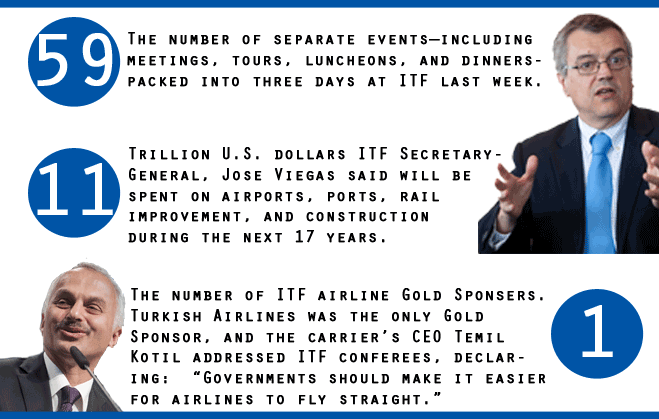 |

The
stakeholders—governmental,
regulatory, and corporate—got
together.
Companies
such as DHL and DEKRA were able
to present themselves to the
delegates and public, and a
lot of cloudy statements were
made to the commitment of “sustainability”
and much other buzz and branding
jargon was in ample supply last
week in Leipzig.
Jens/Sabiha
Arend
|


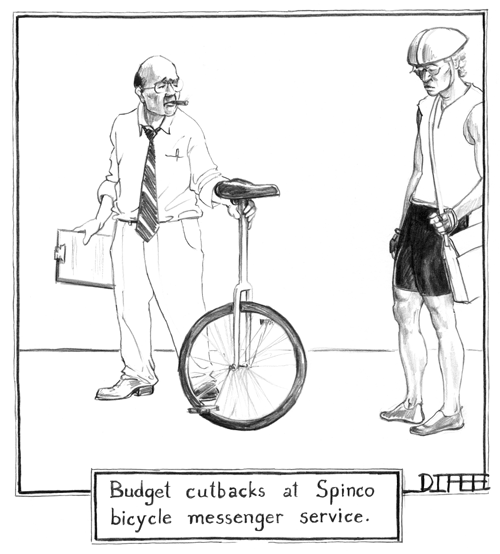

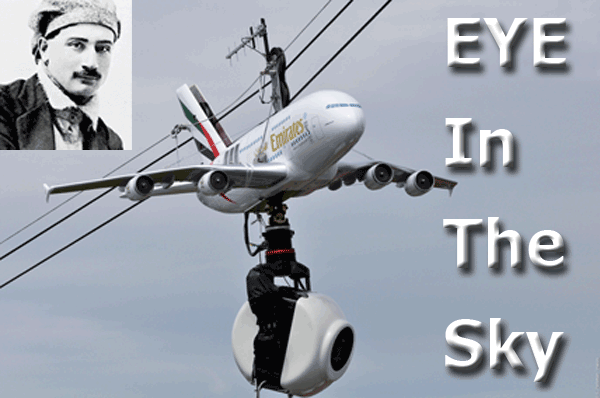

 Panelists
at the ITF Summit on Funding
Transport.
Panelists
at the ITF Summit on Funding
Transport.






